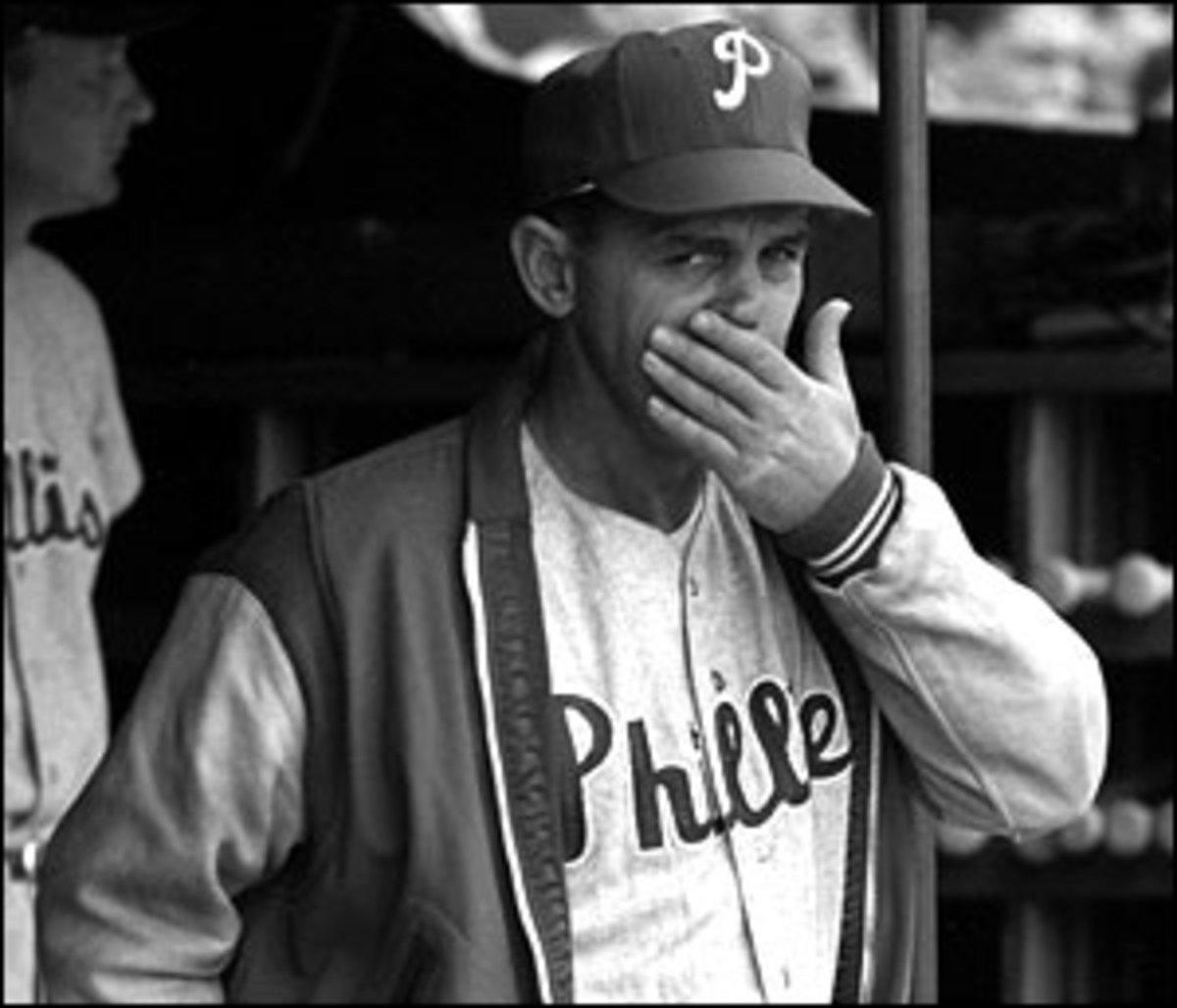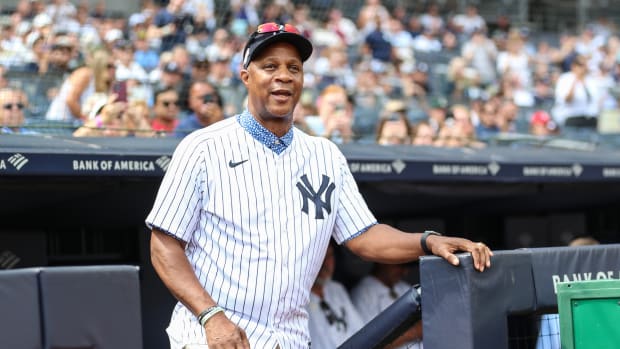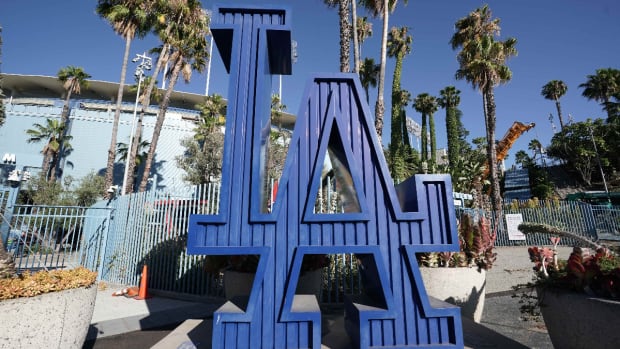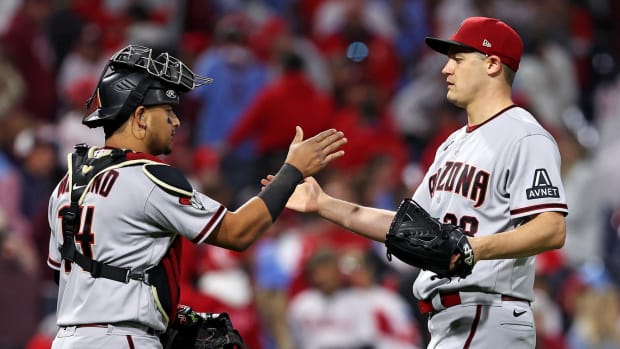
The Beautiful Losers
The existentialist Samuel Beckett exhorted, "Fail better." And no professional sports team has ever failed better or with greater frequency than the Philadelphia Phillies. Failure has become synonymous with a franchise whose players have borne such nicknames as Losing Pitcher (Hugh Mulcahy) and What's the Use? (Pearce Chiles). If luck is on the Phils' side -- and over 125 seasons it rarely has been -- one day before the end of July they will record their 10,000th defeat, a milestone never before reached by any franchise in any sport. Through Sunday the tragic number stood at 9,991; the next most prolific losers, the Braves, are at 9,677.
The Phillies' lack of success has been monumental. From 1918 through '48 they had only one winning season. Between 1920 and '45 they lost 100 or more games 12 times. Over 27 seasons, from 1919 through '45, they had 16 last-place finishes. During World War II owner Bob Carpenter tried to shed the Phils' loser image by renaming his club the Blue Jays. But students at Johns Hopkins, where sports teams also use that sobriquet, objected on the grounds that the change would be demeaning to birds.
On the Phillies' lowlight tape, of course, the most phantastic phree-phall is the Phillie Phlop. Up by 61?2 games in 1964 with only 12 remaining, the team lost 10 in a row and the pennant. Asked in '76 what he remembered about the implosion, manager Gene Mauch muttered, "Only every pitch."
Which is not to say that skippering the Phils is a no-win situation. The franchise has won a World Series (1980) and played 57 postseason games, 35 of them losses (which, incidentally, are not counted toward the 10,000 total). As ex-Phillies infielder Solly Hemus observed in the mid-1950s, "Even monkeys fall out of trees once in a while."
Happily, the Phils -- and virtually everybody associated with the team, from employees to fans to players -- are never at a loss for words. Here are some gleaned from a century and a quarter of the 10 not-so-grand.
Loss number 1, May 1, 1883
"I hope this doesn't start a trend."
-- Jamie Moyer, lefthanded pitcher and current Phillie, when asked what his forebear John Coleman might have said after the franchise, then named the Quakers, dropped its inaugural game 4-3 to the Providence Grays. Coleman lost that game and 47 others in '83, and the team finished 17-81.
Loss number 2,657, June 29, 1921
"Not anymore. I've been traded to the Giants!"
-- Casey Stengel, gimpy-kneed Phillies outfielder, when asked if his leg hurt. Told of the swap in the Baker Bowl locker room during a rain delay, Stengel dashed half-clothed into the deluge and gleefully circled the bases, sliding into each bag.
Losses number 2,523 through 3,484, April 14, 1920, to Oct. 5, 1929
"In the 20s the Baker Bowl groundskeeper was so desperate for help to maintain the playing field that he hired some sheep to trim the grass. When they weren't eating the field, the sheep -- two ewes and a ram -- lived under the leftfield stands."
-- Rich Westcott, co-author of the Phillies Encyclopedia, on the perpetually undercapitalized Jazz Age Phils, who were in effect their own farm team
Loss number 3,586, Sept. 28, 1930
"Have you looked at my pitching, by any chance?"
-- Burt Shotton, manager, on why his Phils had finished last, 40 games back, despite a team batting average of .315, second highest in the NL since 1900. The pitching staff, meanwhile, had a 6.71 ERA and surrendered 1,993 hits in 1,372 innings.
Loss number 4,257, June 30, 1938
"Baker Bowl passed out of existence as the home of the Philadelphia Phillies yesterday afternoon. Equal to the occasion, the Phillies almost passed out with it by providing one of their inimitable travesties, a delineation in which they drolly absorbed a 14 to 1 pasting [at the hands of the New York Giants]."
-- Bill Dooly, The Philadelphia Record sportswriter
Losses number 4,751 through 4,840, April 24 to Sept. 29, 1943
"The guy knew next to nothing about baseball. Otherwise, why would he have put money on the Phillies?"
-- Rich WesTcott, on owner William Cox, who was banned from the sport for life by commissioner Kenesaw Mountain Landis after betting on his team, which lost 90 games that season
Loss number 4,962, June 2, 1945
"Vince DiMaggio hit a pinch grand slam, yet the Phillies still got beat by the Pirates. Vince led the National League in strikeouts that season despite missing almost all of September with an injury. It figures we got Vince, and not Joe or Dom. When brothers played in the majors, the Phillies usually wound up with the one who produced less. We had Harry Coveleski instead of Stan, Irish Meusel instead of Bob, Frank Torre instead of Joe, Ken Brett instead of George, Mike Maddux instead of Greg, Rick Surhoff instead of B.J. and Jeremy Giambi instead of Jason. If there had been a Zeppo Alou, the Phillies would have signed him."
-- Harold Herman, 90-year-old fan
Loss number 5,818, April 22, 1956
"The Philadelphia fans are the worst in the world. They don't deserve a major league franchise. I wouldn't mind getting hit by a regular bottle, but when they break off the tops before throwing them, that's just too much."
-- Whitey Lockman, New York Giants first baseman, after a 9-7 victory over the Phils
Loss number 6,152, April 12, 1960
"I'm 49 years old, and I want to live to be 50."
-- Eddie Sawyer, explaining why he resigned as Phils manager after the season opener, a 9-4 drubbing by Cincinnati
Losses number 6,311 through 6,333, July 29 to Aug. 20, 1961
"No matter what we tried, it didn't work. The only thing that I didn't try was suicide."
-- Gene Mauch, on the Phillies' 23-game losing streak, tied for the third-longest in baseball history
Loss number 6,333, Aug. 20, 1961
"Go in twos and threes. That way, they won't be able to get us all at once. They're selling rocks at a dollar a pail."
-- Frank Sullivan, pitcher, peering out a plane window at the hundreds of fans awaiting the team at Philadelphia Airport after a road trip
Losses number 6,569 through 6,578, Sept. 21-30, 1964
"Mauch was a volatile, damned-near-scary skipper who could straighten you out in a hurry. What puzzled us during the crash was how quiet he was. I guess he thought he was taking the pressure off us players by not jumping our asses. We all waited for him to scream at us or throw a chair or upset a meal table, but he never did. If he had, we might have responded."
-- Dallas Green, pitcher and future Phils manager, on the '64 collapse
"It was like swimming in a long, long lake, and then you drown."
-- Cookie Rojas, utilityman, on the Philly Phlop
Loss number 7,124, June 26, 1971
"We were losing by [seven runs to the Pirates] when a flaky rookie named Roger Freed led off an inning with a hit. When Roger came around to score, he figured he was done for the day. But we nearly batted around in the inning, and Roger was nowhere to be found. Eventually, one of the coaches discovered him in the sauna, where he was trying to lose weight by doing sit-ups as he ate fried chicken."
-- Larry Bowa, shortstop and future Philadelphia manager
Loss number 7,206, June 6, 1972
"We had lost 18 of 19 games when the club vice president Bill Giles tried to break the hex by staging Turn It Around Night at Veterans Stadium. Just about everything was backward: Starting lineups were introduced in reverse order, the seventh-inning stretch was held in the third inning, and the national anthem was played after the game [against the Houston Astros] ended. Plus, hex signs were handed out to the first 10,000 fans. Ballplayers abhor being mocked, but this promotion was so whimsical that we embraced it. Our players were horse -- , but Turn It Around Night was a blast."
-- Tim McCarver, catcher
Loss number 7,226, July 9, 1972
"Nobody's gonna make a scrapgoat out of me."
-- Frank Lucchesi, manager, after a 26-50 start led to his firing
Losses number 7,619 and 7,620, July 10, 1977
"The Phillies would win the National League East even though we took only one of the nine games we played at Three Rivers Stadium in Pittsburgh. Two of those losses came during a doubleheader [against the Pirates]. In the clubhouse after closing out both defeats, Tug McGraw announced he had pitched so poorly that he belonged in jail. Then he took a cab to a city jail and asked the desk sergeant to put him behind bars. The cop was happy to, and Tug spent the night in lockup."
-- Jay Johnstone, outfielder
Postseason loss number 13, Oct. 7, 1977
"In the third game of the NLCS we led the Dodgers 5-3 going into the top of the ninth. They had two outs and nobody on base when Vic Davalillo beat out a bunt. Then Manny Mota smacked an 0-2 pitch to Greg Luzinski in left. Ordinarily, Bull would have been lifted for defense. But our manager, Danny Ozark, wanted to keep Bull's bat in the lineup. Luzinski backed up to the wall, got his glove on the ball but couldn't hold it. Davalillo scored, and Mota went to third on a bad relay. The next guy up, Davey Lopes, hit a shot at Mike Schmidt that took a wicked hop and bounced off him toward short, where Larry Bowa barehanded the carom and fired to first. Bowa's throw beat Lopes, but the ump [Bruce Froemming] called Davey safe, and the score was tied. Not long after that, Lopes scored what proved to be the winning run on Bill Russell's single. Angry as hell, I stormed back to my office, punched the door and broke my hand. It was our only break that day."
-- Bill Giles, team vice president and current team chairman
Losses number 7,779 through 7,783, Aug. 25-29, 1979
"Even Napoleon had his Watergate."
-- Danny Ozark, manager, on getting axed after a five-game skid
Loss number 8,136, Sept. 25, 1984
"At the end of the season I lost three straight, the last on a walk-off homer by Rusty Staub that made him the [second big leaguer after Ty Cobb] to hit one out in his teens and 40s. I drank a lot during that streak, but the disobedient slider Staub hit was the first Rusty nail I ever served."
-- Larry Andersen, relief pitcher and current Phillies TV analyst
Loss number 9,153, May 7, 1997
"After the Cardinals had beaten us 14-7, Bobby Munoz, publicly criticized the pitch-calling of our catcher, Mike Lieberthal. So Terry Francona, our nice-guy rookie manager, called his first -- and only -- team meeting. He screamed, 'I'm sick and tired of you guys acting like p----- and airing out your grievances in the newspapers.' He went on like that for 10 minutes. When the meeting broke, he called me, the old veteran, into his office. I thought he was gonna chew my head off, but he just smiled and asked, 'How'd I do?' I smiled back and said, 'Man, you were awesome!'"
-- Rex Hudler, outfielder
Loss number 9,481, Sept. 24, 2000
"On Fan Appreciation Day my tires were slashed."
-- Terry Francona
Loss number 9,987, June 15, 2007
"If we have 10,000 losses and 8,800 victories, that means we're only a hundred-and-something wins away from reaching the .500 mark."
-- Charlie Manuel, arithmetically-challenged Phillies manager, after a 12-8 loss to the Tigers.
Loss number 9,988, June 17, 2007
"A local sports-radio host wants the city to celebrate the 10,000th loss with a parade. I think that would be a disgrace. The Phils are my grandfather's team, my father's team, my team, my sons' team and my grandchildren's team. We fans will endure this humiliation, and then maybe we'll start on our second 10,000."
-- Ed Deal, 61-year-old ballpark security guard



































